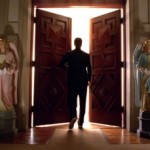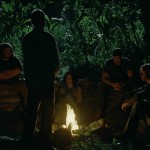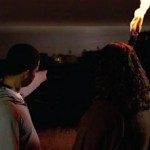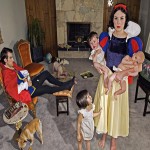 Lost is dead. Long live Lost. And so it ends, in much the same way it began—with a close-up of Jack’s eye, staring straight up past the tall stalks of bamboo that circled the sky above. This time however, that eye would close, and with it, our six-season journey that took us right back to where we started—with questions about a mysterious show that seemed to parallel the mysteries of life. For some, the journey was far more compelling than the destination. For others, it was the perfect resolution and they can walk away feeling fulfilled. Whatever you thought about the conclusion, the one thing most viewers can agree on is that the show challenged us to think in ways we might not have otherwise. In short, Lost was a real trip. And what a long, strange trip it’s been.
Lost is dead. Long live Lost. And so it ends, in much the same way it began—with a close-up of Jack’s eye, staring straight up past the tall stalks of bamboo that circled the sky above. This time however, that eye would close, and with it, our six-season journey that took us right back to where we started—with questions about a mysterious show that seemed to parallel the mysteries of life. For some, the journey was far more compelling than the destination. For others, it was the perfect resolution and they can walk away feeling fulfilled. Whatever you thought about the conclusion, the one thing most viewers can agree on is that the show challenged us to think in ways we might not have otherwise. In short, Lost was a real trip. And what a long, strange trip it’s been.
 In the penultimate episode of Lost, “What They Died For,” Jacob tells the surviving Losties why he chose them as candidates: “I chose you because you were all alone. You were all looking for something that you couldn’t find out there. I chose you because you needed this place as much as it needed you.” This explanation really resonated with me, on one hand because it provided a mythologically sound answer to the main question I’ve always had about Lost: why do all these characters have major issues? And having that answer provided the other reason I really liked the explanation: I immediately understood that while Jacob was addressing the remaining candidates, he was really speaking to us.
In the penultimate episode of Lost, “What They Died For,” Jacob tells the surviving Losties why he chose them as candidates: “I chose you because you were all alone. You were all looking for something that you couldn’t find out there. I chose you because you needed this place as much as it needed you.” This explanation really resonated with me, on one hand because it provided a mythologically sound answer to the main question I’ve always had about Lost: why do all these characters have major issues? And having that answer provided the other reason I really liked the explanation: I immediately understood that while Jacob was addressing the remaining candidates, he was really speaking to us.
 In “Across the Sea,” Lost finally gives us the origins story for Jacob and the Man In Black. The episode was pure, 100% mythology. Those who watched the episode based on the surface story alone were probably disappointed. Let’s face it, taken literally, myths are silly: talking snakes, little boys defeating giants, jealous gods, immaculate conceptions, mortals with superpowers, a sword stuck in a stone, the Force, Never Never Land, Wonderland, Oz, the Matrix, the Island. On the surface, all myths seem like children’s stories. It’s only when we dig deeper that we find the truth worthy of a wise old soul—a soul that knows where it really came from.
In “Across the Sea,” Lost finally gives us the origins story for Jacob and the Man In Black. The episode was pure, 100% mythology. Those who watched the episode based on the surface story alone were probably disappointed. Let’s face it, taken literally, myths are silly: talking snakes, little boys defeating giants, jealous gods, immaculate conceptions, mortals with superpowers, a sword stuck in a stone, the Force, Never Never Land, Wonderland, Oz, the Matrix, the Island. On the surface, all myths seem like children’s stories. It’s only when we dig deeper that we find the truth worthy of a wise old soul—a soul that knows where it really came from.
 Wanna know why the Man In Black is really trapped on the island? It’s not because he’s malevolence, evil, or darkness, and it’s not because Jacob wouldn’t let him leave. It’s because he hasn’t overcome his issues. And what are his issues? Up to now, all we know is that he seems to be terribly frightened of adolescent boys. Hopefully, we’ll get a better answer next week, but as ridiculous as this might sound, I actually think there may be something to it.
Wanna know why the Man In Black is really trapped on the island? It’s not because he’s malevolence, evil, or darkness, and it’s not because Jacob wouldn’t let him leave. It’s because he hasn’t overcome his issues. And what are his issues? Up to now, all we know is that he seems to be terribly frightened of adolescent boys. Hopefully, we’ll get a better answer next week, but as ridiculous as this might sound, I actually think there may be something to it.
 In Lost’s “The Last Recruit,” the Man In Black refers to John Locke as a “sucker” for believing in fate. As he points out, Locke pursued this belief until it got him killed so perhaps MIB has a point. Despite his compelling argument, Jack takes a leap of faith towards the exact same conclusion as his former nemesis. So does this make Jack—the last recruit himself—a sucker too? My short answer is yes, but, what if this isn’t necessarily a bad thing?
In Lost’s “The Last Recruit,” the Man In Black refers to John Locke as a “sucker” for believing in fate. As he points out, Locke pursued this belief until it got him killed so perhaps MIB has a point. Despite his compelling argument, Jack takes a leap of faith towards the exact same conclusion as his former nemesis. So does this make Jack—the last recruit himself—a sucker too? My short answer is yes, but, what if this isn’t necessarily a bad thing?
 In Lost’s “Everybody Loves Hugo,” Richard complains that Jacob “never tells us what to do.” Richard’s frustration echoes clearly into our world. For most of us, Jacob, aka God, never seems to tell us what to do. He just sits back and lets us make our own mistakes, leading to countless horrors and suffering. For many, this is a major argument as to why there is no God. Yet, when watching Lost, we see that Jacob does in fact tell the Losties what to do—sometimes directly, sometimes through his lists or clues, and sometimes through messages that he passes on through his emissaries. But certainly this doesn’t happen in our world. Here, there are no ghosts of Michaels past, otherworldly whispers, or visits from dimension-hopping Desmonds to guide us on our journey through life. Or…is there?
In Lost’s “Everybody Loves Hugo,” Richard complains that Jacob “never tells us what to do.” Richard’s frustration echoes clearly into our world. For most of us, Jacob, aka God, never seems to tell us what to do. He just sits back and lets us make our own mistakes, leading to countless horrors and suffering. For many, this is a major argument as to why there is no God. Yet, when watching Lost, we see that Jacob does in fact tell the Losties what to do—sometimes directly, sometimes through his lists or clues, and sometimes through messages that he passes on through his emissaries. But certainly this doesn’t happen in our world. Here, there are no ghosts of Michaels past, otherworldly whispers, or visits from dimension-hopping Desmonds to guide us on our journey through life. Or…is there?
 Once upon a time, you believed that you were very special. That you’d grow up to make a difference in the world, be paid handsomely for doing so, find true love, have some equally special children, and live happily ever after. Unfortunately, life hasn’t worked out quite as good as the fairytale. So, were we all lied to? In Lost’s “Happily Ever After” Desmond discovers that there is a reality where all his dreams can come true. So where is this reality and do we need to be as special as Desmond to get there?
Once upon a time, you believed that you were very special. That you’d grow up to make a difference in the world, be paid handsomely for doing so, find true love, have some equally special children, and live happily ever after. Unfortunately, life hasn’t worked out quite as good as the fairytale. So, were we all lied to? In Lost’s “Happily Ever After” Desmond discovers that there is a reality where all his dreams can come true. So where is this reality and do we need to be as special as Desmond to get there?
 In “The Package” Jin is distraught over having his $25,000 confiscated at the airport, Sun is panicked that her lavish bank account was emptied by her father, Widmore is angry that events aren’t going according to plan, and Desmond didn’t seem particularly happy about being drugged, stuffed in a sub, and brought back to the island. But if there’s anything that life and Lost teach us, it’s that our plans aren’t always in our own best interest. They say that man plans and God laughs. The question is, is God laughing with us, or at us?
In “The Package” Jin is distraught over having his $25,000 confiscated at the airport, Sun is panicked that her lavish bank account was emptied by her father, Widmore is angry that events aren’t going according to plan, and Desmond didn’t seem particularly happy about being drugged, stuffed in a sub, and brought back to the island. But if there’s anything that life and Lost teach us, it’s that our plans aren’t always in our own best interest. They say that man plans and God laughs. The question is, is God laughing with us, or at us?
 In “Ab Aeterno,” Richard Alpert loses his faith after discovering that the plan he’s dedicated so much of his life to, may in fact, not exist. From the very same episode, some Lost fans began feeling the same. For six years, Lost viewers with an insatiable hunger for answers have anxiously waited to find out what the mysterious island actually is. At the writer’s strike a couple years ago, Carlton Cuse held up a picket sign that read: “Do You Want To Know What The Island Is??” Thousands of fans have dreamed up imaginative theories, all in an attempt to solve the show’s complex riddle. And now at last we have our answer! According to Jacob himself, the island is…A CORK!!! (crickets)
In “Ab Aeterno,” Richard Alpert loses his faith after discovering that the plan he’s dedicated so much of his life to, may in fact, not exist. From the very same episode, some Lost fans began feeling the same. For six years, Lost viewers with an insatiable hunger for answers have anxiously waited to find out what the mysterious island actually is. At the writer’s strike a couple years ago, Carlton Cuse held up a picket sign that read: “Do You Want To Know What The Island Is??” Thousands of fans have dreamed up imaginative theories, all in an attempt to solve the show’s complex riddle. And now at last we have our answer! According to Jacob himself, the island is…A CORK!!! (crickets)
 In “Recon,” James Ford learns a life-changing lesson from a TV show just as we are learning from Lost. The metaphor is clear: there are messages in the media that are meant to help guide us on our journey. All you have to do is let yourself see through to their true meaning in order to uncover the wisdom.
In “Recon,” James Ford learns a life-changing lesson from a TV show just as we are learning from Lost. The metaphor is clear: there are messages in the media that are meant to help guide us on our journey. All you have to do is let yourself see through to their true meaning in order to uncover the wisdom.
 Lost is dead. Long live Lost. And so it ends, in much the same way it began—with a close-up of Jack’s eye, staring straight up past the tall stalks of bamboo that circled the sky above. This time however, that eye would close, and with it, our six-season journey that took us right back to where we started—with questions about a mysterious show that seemed to parallel the mysteries of life. For some, the journey was far more compelling than the destination. For others, it was the perfect resolution and they can walk away feeling fulfilled. Whatever you thought about the conclusion, the one thing most viewers can agree on is that the show challenged us to think in ways we might not have otherwise. In short, Lost was a real trip. And what a long, strange trip it’s been.
Lost is dead. Long live Lost. And so it ends, in much the same way it began—with a close-up of Jack’s eye, staring straight up past the tall stalks of bamboo that circled the sky above. This time however, that eye would close, and with it, our six-season journey that took us right back to where we started—with questions about a mysterious show that seemed to parallel the mysteries of life. For some, the journey was far more compelling than the destination. For others, it was the perfect resolution and they can walk away feeling fulfilled. Whatever you thought about the conclusion, the one thing most viewers can agree on is that the show challenged us to think in ways we might not have otherwise. In short, Lost was a real trip. And what a long, strange trip it’s been.









